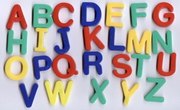Fronting is an issue of speech development in which children learning to speak inadvertently move the point of articulation for some sounds forward in their mouths. Velar fronting occurs in words with consonants formed by contacting the middle of your tongue, such as "give" and "kiss," and results in the pronunciations "div" and "tiss." Palatal fronting occurs in words with fricative sounds such as "ship" and "measure," resulting in "sip" and "mezza." Speech therapy activities can help.
Word Collage
As with other articulation issues, correcting fronting issues require children to recognize not only the correct position of their tongue in pronouncing each word, but also what words will likely cause them problems. By searching through magazines, comics and other images, children can create a collage of words that challenge them. For example, if having issues with velar fronting, children might find images of seagulls, wings, running, kites, kangaroos or girls. If having issues with palatal fronting, they might find pictures of ships, shops, tape measures, treasure and something sharp. By identifying, highlighting and returning to problem words on a word collage, children can maintain an understanding of what enunciation issues they are working to correct.
Board Games
Games that rely upon the movement of a board piece to a finish line or goal such as Monopoly or Parcheesi, afford children the opportunity to enjoy themselves while practicing their pronunciation. As they move through the game, children can pronounce a trouble word prior to moving to the next position. Additional bonuses can be worked into the game such as a pronunciation prize that allows children to move forward a certain number of spaces equivalent to the number of trouble words they can correctly pronounce. For example, move forward three spaces in Parcheesi if you correctly pronounce three words that begin or include the letters "sh."
Active Games
Games that involved physical activity challenge children to employ their pronunciation skills while simultaneously moving and focusing on that movement. A simple game of catch in which a child pronounces a trouble word upon catching a ball allows the child to develop and employ their pronunciation skills in a natural way that eventually feels like second nature.
Conversation
Encourage children to incorporate trouble words into casual conversation. This can be done intentionally and obviously by asking students leading questions that force them to answer by using trouble words. One example would be "Are scissors sharp or dull?" It can be done more subtly by taking the child to a location at which some of the trouble words might be located. For example, in taking a child to the beach, they might see a gull, a sand castle, arcade games or a roller coaster.
Related Articles
References
- "Helping Children to Improve Their Communication Skills: Therapeutic Activities for Teachers, Parents and Therapists"; Deborah M. Plummer and Alice Harper; 2011
Writer Bio
Samuel Hamilton has been writing since 2002. His work has appeared in “The Penn,” “The Antithesis,” “New Growth Arts Review" and “Deek” magazine. Hamilton holds a Master of Arts in English education from the University of Pittsburgh, and a Master of Arts in composition from the University of Florida.











